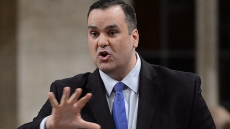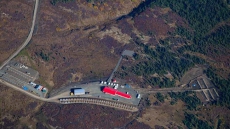OTTAWA — "We are phasing out the use of traditional dirty coal. It's going to go to zero in the next 15 years or so. It's not high now and it's continuing to phase out. This is the biggest, single greenhouse emitting, greenhouse gas emitting source in the world, this coal fired electricity. So if others would just follow our lead, we'd have this problem solved."
— Prime Minister Stephen Harper in a year-end interview on CBC.
———
The Canadian government's efforts to reduce greenhouse gas emissions as part of the global fight against climate change have routinely been attacked as not going far enough.
Prime Minister Stephen Harper, however, insists that Canada needs to act in lockstep with other countries and with global competitiveness in mind, especially when it comes to emissions related to the oil and gas sectors.
But Harper says Canada is a leader when it comes to reducing emissions in other sectors, especially coal.
Are the steps Canada is taking in that sector as effective as he claims?
Spoiler alert: The Canadian Press Baloney Meter is a dispassionate examination of political statements culminating in a ranking of accuracy on a scale of "no baloney" to "full of baloney" (complete methodology below).
This one earns a rating of "some baloney" — the statement is partly accurate but important details are missing.
Here's why:
THE FACTS
Coal is responsible for about 44 per cent of the world's greenhouse gas emissions, a figure which continues to rise as developing countries rely on the fossil fuel to power their economies.
In Canada, coal accounts for about 12 per cent of emissions, a figure which has been falling as the country switches to producing more energy from renewable sources like hydro and nuclear power.
In 2012, regulations on coal emissions in Canada were passed by the Conservative government and starting in July 2015, any new coal-fired power plant will have to limit their emissions, as will old ones as they reach the end of their useful lifespans, which is between 45 and 50 years after they are built.
The regulations, coupled with actions taken by the provinces, such as Ontario's move to close all coal-fired plants, will see emissions from coal continue to fall over the next 15 years, according to data from Environment Canada.
In 2030, emissions from coal are projected to be 26 megatonnes, down from 101 in 2005, according to Environment Canada's report to the United Nations this year.
One reason they won't be at zero within the 15-year timeline suggested by the prime minister is that not all existing coal-fired power plants will be required to comply with the regulations by then.
By one count, there are at least 10 units which won't fall under the regulations until after 2030, including one that won't be affected until 2062.
WHAT THE EXPERTS SAY
"If it were the way he had described it — by 2030 all coal has to turn off — that would be a big deal globally," climate policy analyst P.J. Partington, who did the tally of plants subject to regulations, said of Harper's remarks.
"Unfortunately, that's not how Canada's policy works. So if other countries were to follow our lead, that would mean allowing every coal plant that has been built or will be built by the middle of next year to run for its full economic life, which means you still have coal running around the world until the mid 2060s. I don't think that's really the solution we need to be looking at."
There are reports of close to 1200 new coal-fired power plants being proposed around the world, with the bulk in China and India.
"Currently, coal fills much of the growing energy demand of those developing countries (such as China and India) where energy-intensive industrial production is growing rapidly and large coal reserves exist with limited reserves of other energy sources," says the International Energy Institute.
While it is true that coal is the dirtiest fossil fuel, it's also not the biggest part of greenhouse gas pollution in Canada, said Claire Demerse, a senior policy adviser with Clean Energy Canada.
"The federal government has not imposed any regulations at all on Canada's biggest source of greenhouse gas pollution, the oil and gas sector," she said.
"Unless Canadian governments set stronger rules to cut greenhouse gas pollution, Canada's emissions are projected to grow over the next five years and keep growing during the decade after that."
Other countries are regulating the coal sector.
The United States — where coal makes up about a third of total emissions — proposed its own regulations this year.
They are similar to Canada's but one major difference is how fast they would come into effect.
The new rules would impose performance standards immediately, meaning they would lower emissions almost right away.
The regulations are not yet in force.
However, neither set of regulations will get either country to its emissions target set in Copenhagen.
"While both policies will reduce total national emissions, significant gaps are likely to remain with respect to both countries' Copenhagen pledges to reduce 2020 emissions to 17 per cent below 2005 levels—with the U.S. projected to be 7.6 per cent below 2005 levels by 2020, and Canada 0.4 per cent," said a September study by the International Institute for Sustainable Development.
THE VERDICT
It will be a lot longer than 15 years before coal-fired electricity drops to zero in Canada, but it is in the process of being phased out.
Emissions from the coal sector are responsible for the largest share of greenhouse gases globally and getting them down will bring total emission levels down; but with levels in the oil and gas sector likely to rise, the overall problem remains.
For these reasons, Harper's statement contains "some baloney."
METHODOLOGY
The Baloney Meter is a project of The Canadian Press that examines the level of accuracy in statements made by politicians. Each claim is researched and assigned a rating based on the following scale:
No baloney — the statement is completely accurate
A little baloney — the statement is mostly accurate but more information is required
Some baloney — the statement is partly accurate but important details are missing
A lot of baloney — the statement is mostly inaccurate but contains elements of truth
Full of baloney — the statement is completely inaccurate
———
SOURCES
CO2 Emissions from Fuel Combustion, International Energy Agency:
http://www.iea.org/publications/freepublications/publication/CO2EmissionsFromFuelCombustionHighlights2013.pdf
Canada's Emissions Trends 2014, Environment Canada
http://ec.gc.ca/Publications/E998D465-B89F-4E0F-8327-01D5B0D66885/ETR_E-2014.pdf
Canada’s Sixth National Report on Climate Change 2014
A Climate Gift or a Lump of Coal? The emission impacts of Canadian and U.S. greenhouse gas regulations in the electricity sector, International Institute for Sustainable Development.
http://www.iisd.org/sites/default/files/publications/climate-gift-or-lump-of-coal.pdf
Global Coal Risk Assessment, World Resources Institute





